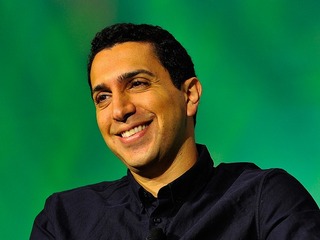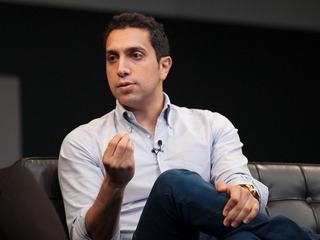Digital health funding declines for the third year in a row
AI-enabled digital health startups raised $3.7B, 37% of total funding for the sector
Read more...
Now that Uber's shareholders and board forced CEO Travis Kalanick to resign, some may be wondering where he'll end up next.
From our perch, it's unclear, though given that his ousting had a lot to do with his inability to make changes but rather cultivate toxic patterns of behavior, he may not be a CEO anytime soon.
He obviously isn't the first big name CEO to step down from his company, so there is some precedent for what his future career might look like.
These are just a few of his options, based on what others have done before him.

Perhaps the most famous post-CEO life belongs to Bill Gates, who left Microsoft in 2000, and stopped working full time at the company in 2006 to instead work at the Bill & Melinda Gates Foundation, a private foundation founded by Gates and his wife, with the aim of enhancing healthcare, reducing poverty, and expanding access to education and information technology.
Through the end of 2015, the Foundation had an endowment of $39.6 billion, and had given out $36.7 billion in grant payments.
Gates has also dedicated himself to saving the environment, launching a $1 billion fund, along with Jack Ma, Reid Hoffman, Vinod Khosla and others, at the end of last year.

Steve Ballmer, Gates' successor, has also had a pretty high profile life after leaving Microsoft. Rather than starting his own company, or following in Gates' footsteps and devoting his life to charity, Ballmer did something more surprising: he bought a basketball team.
After leaving the company in September 2013, Ballmer spent $2 billion to acquire the Los Angeles Clippers in August 2014, following the whole Donald Sterling fiasco (remember that?).
Since then, the Clippers have made the playoffs every year, though they've never made it beyond the semi-finals.

The truth is, though, that both Gates and Ballmer were at the end of long careers, and really had nothing else to prove at that point. They could go on to do other things. Kalanick, on the other hand, is only 40 years old, and it would seem obvious to say that he has quite a bit to prove right now, mostly that he can once again be thought of as a responsible CEO.
So, staying in the tech world in some capacity seems very likely. In that case, maybe he can take the same route as Evernote founder and CEO Phil Libin, who went to the other side of the ecosystem.
In July of 2015, Libin revealed that he was stepping down as CEO, a position he had held since the company was founded in 2007. In September of that year, Libin joined General Catalyst Partners as a Managing Director. His investments included Growbot, Butter.ai and Begin.
Libin stepped down in May of 2017 to start All Turles, a startup studio for AI companies, though he is still listed as a Senior Advisor at General Catalyst.

Maybe, one day, when things have died down a bit, and the press has moved onto other things, Kalanick can reclaim his throne.
It seems unlikely, but it has happened before. CEOs like Mark Pincus and Jack Dorsey have come back to the companies they once ran, but the most apt comparison is to another CEO who got wrapped up in a sexual harassment scandal, only to be welcomed back not long after.
Tinder CEO Sean Rad, like Kalanick, was never accused of harassing anyone himself, but of creating a culture where such actions were permitted. Rad's firing seemed like damage control over a very public sexual harassment claim from company co-founder, and former VP of Marketing, Whitney Wolfe. Tinder settled the sexual harassment claim, with the company having not actually admitted any wrongdoing.
He officially lost his job in November of 2014, was not replaced until March of 2015, and was then rehired in August. Less than a year later, Rad was right back where he had started.
Rad did step down from the job again in December of last year, this time to become chairman, and to will Swipe Ventures, Tinder's merger and acquisition branch.

The most likely move for Kalanick, though, is the most obvious one: to start a new company. That's what ex-Twitter CEO Dick Costolo did.
After being forced to resign his position as CEO of Twitter in 2015, after years of stagnant growth. A year later he returned with a new company, a digital fitness startup called Chorus.
"We’re building a product that uses the power of small teams to keep people accountable to healthy goals. We believe that being together is a lot better than going it alone, and know that great things happen when you commit to doing small things every day," is how the company describes itself. The company is still in beta, and began testing with fitness coaches and small groups in April.
In addition, Costolo also took the Libin route and became a Venture Partner at Index Ventures.
This seems like the most likely way to go, given that Uber was not Kalanick's first company. In 1998, he founded Scour, a multimedia search engine, which also Scour Exchange, a peer-to-peer file sharing service; it only lasted until 2000, after being sued by the MPAA, RIAA and NMPA. He also founded Red Swoosh, another peer-to-peer file-sharing company, in 2001; it was sold to Akamai Technologies acquired the company for $19 million in 2007.
Founding companies is what Kalanick does. Let's just hope he learned some lessons from what happened at Uber.
(Image source: businessinsider.com)
AI-enabled digital health startups raised $3.7B, 37% of total funding for the sector
Read more...OXcan combines proteomics and artificial intelligence for early detection
Read more...Nearly $265B in claims are denied every year because of the way they're coded
Read more...Startup/Business
Joined Vator on
Our goal at Evernote is to give everyone the ability to easily capture any moment, idea, inspiration, or experience whenever they want using whichever device or platform they find most convenient, and then to make all of that information easy to find.
And we’ve done just that. From creating text and ink notes, to snapshots of whiteboards and wine labels, to clips of webpages, Evernote users can capture anything from their real and digital lives and find it all anytime.
Evernote is an independent, privately held company headquartered in Mountain View, California. Major investors include Sequoia Capital, Morgenthaler Ventures, Troika Dialog, and DOCOMO Capital.
Angel group/VC
Joined Vator on
There’s a simple premise behind the founding of General Catalyst (GC) in 2000: entrepreneurs are best served by those who've been in their shoes. In fact, all of GC’s managing directors are accomplished entrepreneurs in their own right. We’re familiar with the challenges you face. And we thrive on our ability to use our entrepreneurial experience to assist, guide, and nurture entrepreneurs on their journey.
As a venture capital firm focusing on Early Stage and XIR/Growth investments, we're thrilled to encounter and delight in helping exceptional entrepreneurs and innovative companies bring a new product to market or transform an industry. But it’s more than just writing a big check. We're tireless in our business-building and partnership development assistance.
Angel group/VC
Joined Vator on
Many venture firms would be best described as a collection of free agents who pursue their own deals and share offices and overhead with their partners. They are more mercenary than missionary and will tell you to focus more on the individual partners and less on the partnership. We hope to have the opportunity to show you how we are different.
We are true partners who have built our own firm together, brick by brick; the same way you are building your company. When we commit to supporting your company, each and every partner in our firm commits to contributing his or her network, creativity and resources towards achieving your success. We are big believers in the power of teams.
We believe you will want an investor with whom you can build a close, supportive relationship over a number of years, yet who will be bold enough to challenge your thinking and your expectations. If Index looks like a good fit, we encourage you to learn about us through the stories and news articles on this website. We invite you to read about the companies we have invested in, and to speak to the entrepreneurs we have partnered with. Their experience is our best reference.

Joined Vator on

Joined Vator on

Joined Vator on




